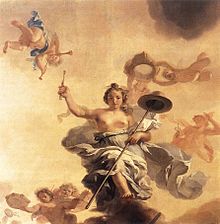Christopher Caudwell
Appearance


Christopher Caudwell is the pseudonym of Christopher St John Sprigg (20 October 1907 – 12 February 1937), a British Marxist writer, thinker and poet.
Quotations
[edit]Studies in a Dying Culture (1938)
[edit]Pacifism and Violence: A Study in Bourgeois Ethics
[edit]- I mean by pacifism, not the love of peace as a good to be secured by a definite form of action, but the belief that any form of social constraint of others or any violent action is in itself wrong, and that violence such as war must be passively resisted because to use violence to end violence would be logically self-contradictory. I oppose pacifism in this sense to the Communist belief that the only way to secure peace is by a revolutionary change in the social system, and that ruling classes resist revolution violently and must therefore be overthrown by force.
- The bourgeois never included the ownership of capital as one of the social restraints that should be abolished, for the simple reason that it was not to him a restraint at all. It never therefore entered his head to regard it as such, and he saw nothing inconsistent in calling for the abolition of privilege, monopoly, and so forth, while hanging on to his capital.
Further Studies in a Dying Culture (1949)
[edit]Chapter IV: Consciousness: A Study in Bourgeois Psychology
[edit]- The bourgeois ... is free not because he is conscious of his causality, but because he is ignorant of the social causes that determine his being.
- The bourgeois ... conception of freedom really arose as a special case of a group of illusions about domination which has been associated with all forms of society based on dominating classes. This group of illusions has for a common factor the belief that domination secures self-determination.
- All relations are determining. ... As soon as we realise there is a determining relation, and become conscious of its nature and how it grips us, we are that much freer.
- Slave-owning culture ... gives rise to the teleological explanation of the Universe, which reaches its subtlest form in Plato’s or Aristotle’s philosophies, in which all phenomena are determined by Ideas or Forms. These correspond to the plans formed in the mind of the slave-owner which his slave passively fulfils.
- The domination inherent in the slave-owning system is not repressed, as with the bourgeois, but is conscious, and the illusion consists, not in supposing that no domination exists, but that society is in fact really determined solely by the will of the master, and does not in turn determine his will.
- The slave-owner is at times visited with a nightmare. He finds that his free will, in spite of its freedom, is thwarted, not by a superior will but by things-in-themselves – by inferior wills, accidents, mistakes, and his own ignorance. Yet he is still unable to conceive his will except as being thwarted like that of his slave’s by another will, and since he the master is so thwarted, might not even the world’s master and his – God Himself – be thwarted in his volition by some grand over-riding will, by Will-in-Itself? This is the slaveowning conception of Moira, or Fate, a comparatively late development reaching its noblest expression in Greek tragedy. This Fate, in spite of its closeness to bourgeois determinism, betrays its slave-owning parentage by the fact that it is always visualised as a consciously forseeing Will, and always as thwarting, not determining human wills as well as events, but interfering with human wills by means of events.
- The bourgeois ... necessarily regards all behaviour that bursts ‘spontaneously’ forth from the individual ignorant of its causality, as above all free. Therefore the instincts are conceived as freely striving for unconscious goals, and psychology becomes the adventures of the free instincts in their struggles against the restraints of the environment (in Freud, of society) which impede and cripple their freedom. Out of this struggle cognitive and emotional consciousness is born.
Now the only objection to this bourgeois psychology is that it inverts the picture. The instincts are not free springs of connation towards a goal. They are, so far as they can be abstractly separated, unconscious necessities, as Kant realised. They are unfree.
- That the environment does wrongs to man’s mind today none will deny. These wrongs are not done because consciousness imprisons the instincts with the fetters of necessity; but because bourgeois man is unconscious of the determinism of his culture. Because of this the instincts are losing such freedom as they attained, are becoming crippled, and less free. Unconsciousness and inexperience, not consciousness and experience, are the gaolers of modern bourgeois man.
External links
[edit]]]

